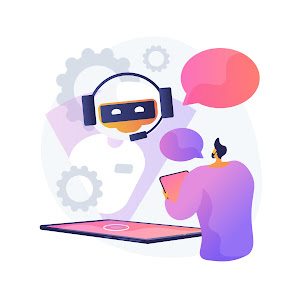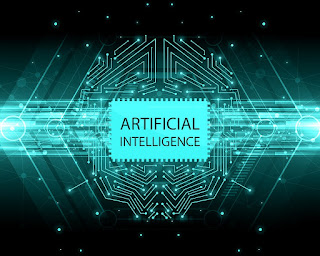What is the Future of Artificial Intelligence?
AI is changing our world every day, from the things we search online to the apps we use and even our shopping recommendations. But what’s really coming down the line for AI? Let's dig into how AI might reshape our lives soon – in the simplest, most down-to-earth way possible.
 |
| 1. Future Of AI |
1. AI in Everyday Life: Where We’re Headed
AI is no longer a science fiction concept; it is here, making our life a little simpler and sometimes a little strange! Here's how it's already making waves and what it could look like shortly.
Healthcare: Smarter, Faster Care
 |
| 2. AI in Healthcare |
AI is becoming extremely useful in hospitals and clinics. It is not a replacement for doctors, but rather a collaborative effort to develop better, faster therapies. Consider a world in which artificial intelligence can detect diseases early on and even provide treatment plans customized just to you. It's already being used to read medical photos, analyze lab findings, and even assist with surgery. And who knows, maybe one day AI will help oversee the entire medical system to ensure that everything runs well.
Finance: Managing Money in a New Way
AI is transforming finance, from fraud detection to tailored investment advice. Consider AI to be a friend who knows all the finest financial hacks and is always keeping an eye on your money. It's already helping major banks and regular people manage their money better, with apps that track spending, recommend budgets, and even advise on saving or investing. AI is making money management easier for everyone.
Self-Driving Cars: Are We There Yet?
 |
| 3. Self- Driving Car |
We've heard a lot about self-driving cars, and while they're not yet widely available, they're on their way. Tesla, Waymo, and other businesses are moving closer to making completely autonomous vehicles a reality. Soon, you might be able to get in a car, instruct it where to drive, and simply sit back - no driving required! This could not only make travel easier, but it may also reduce accidents by eliminating the possibility of human error.
Education: Learning Built for You
AI is also changing how we learn. Consider a classroom (or even an app) that adjusts to each student's learning style and speed. AI is already being employed in virtual tutors and tailored learning platforms, which focus on a student's strengths and assist them with areas where they struggle. It has the potential to make learning more accessible and enjoyable for all, not just in schools, but also in personal and professional growth.
Farming: Technology Meets Agriculture
AI in farming? Of course. Farmers are employing artificial intelligence to examine everything from soil health to crop yields, as well as to predict the optimal time to plant and harvest. Drones and smart sensors enable farmers to work smarter, not harder. This technology could be critical as the world's population grows, allowing us to produce food more efficiently while still being more environmentally friendly.
2. AI and Humans: A Winning Team
AI isn’t here to take over; it’s here to help. Instead of replacing us, it can handle the time-consuming, repetitive tasks, leaving humans free to focus on more creative and important work.
Making Work More Efficient and Fun
AI is becoming a go-to helper in many workplaces. Imagine having an assistant that can take care of scheduling, data analysis, or even customer service. By taking on these repetitive tasks, AI frees people up to tackle the big-picture stuff. In creative fields, it can even help spark ideas or suggest improvements, allowing people to focus on creating and innovating.
The Rise of Personal AI Assistants
 |
| 4. Personal AI Assistant |
AI assistants like Siri and Alexa are just the beginning. Future AI might go beyond just setting reminders and answering questions. It could understand our habits, help us make healthier choices, or even handle complex tasks like coordinating events or planning our days based on our personal goals. It’s like having a super-organized friend who’s always looking out for you.
3. Big Questions: Privacy, Fairness, and Jobs
As awesome as AI is, it comes with challenges. From keeping our data safe to making sure it’s fair for everyone, there are some real questions we need to tackle.
Data Privacy: Who Owns Our Information?
AI systems work by learning from tons of data, including personal information. While this helps them get smarter, it also raises questions about privacy. Companies will need to set up strong protections to keep our data safe and make sure it’s used in ways we’re comfortable with. It’s all about finding a balance between innovation and privacy.
Fighting Bias in AI
AI learns from the data it’s trained on, which can sometimes include human biases. This can lead to biased results in areas like hiring, lending, and even law enforcement. We need to work on making AI as fair and unbiased as possible by carefully monitoring its decisions and using diverse data to train it.
AI’s Impact on Jobs
Sure, some jobs will change or even disappear as AI takes on more tasks, especially the repetitive ones. But AI will also create new opportunities in tech, customer relations, creativity, and more. The trick will be helping people transition to these new roles by providing reskilling and education programs.
 |
| 5. Artificial Inteligence |
4. Cool AI Trends to Keep an Eye On
The future of AI is full of exciting trends, from creative tools to quantum-powered supercomputers.
Generative AI: Creativity Gets a Tech Boost
Generative AI, like the tech behind apps that can create artwork or write stories, is a fun tool for creative industries. It doesn’t replace artists or writers but gives them another resource to work with, helping spark new ideas or providing a starting point.
Quantum Computing and AI: Solving Big Problems
Quantum computing is still in its early stages, but it could work wonders when paired with AI. Think of it as a super-fast, super-smart computer that can tackle huge problems in fields like science, medicine, and technology. It’s a game-changer, and it’s coming sooner than we might think.
Emotionally Intelligent AI
AI is getting better at reading emotions, which could improve interactions in areas like customer service and mental health support. Imagine talking to an AI that can pick up on your mood and adjust its tone or response to make the interaction feel more natural and supportive.
Setting Rules for a Better AI Future
As AI gets more powerful, it’ll need rules to make sure it’s used responsibly. We’re already seeing discussions around setting standards for transparency, fairness, and accountability in AI. It’s about making sure AI tech benefits everyone without causing harm.
 |
| 6. AI Chip |
Embracing an AI-Driven World
AI isn’t just a futuristic concept; it’s here and becoming a bigger part of our lives every day. As we move forward, understanding its potential and preparing for its impact will help us shape a future where AI is a helpful tool, not a threat. Embracing the tech while keeping an eye on its ethical challenges will let us make the most of AI, so it’s a win for everyone.
For More Information Watch This Video




.jpg)

0 Comments
Any Doubts Feel Free And Drop A Comment!